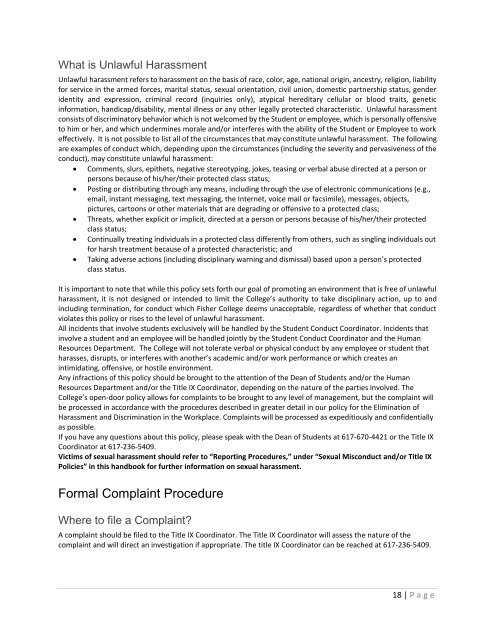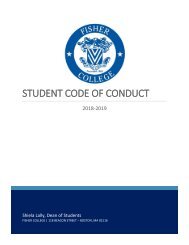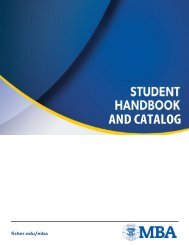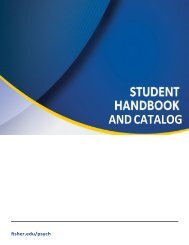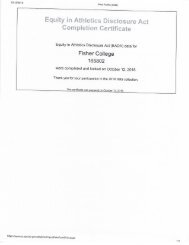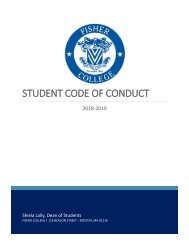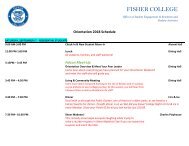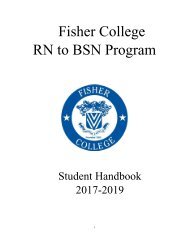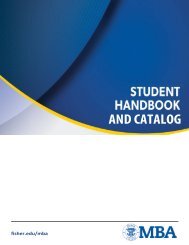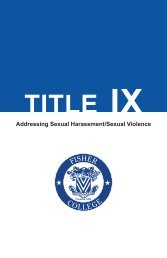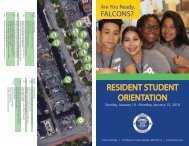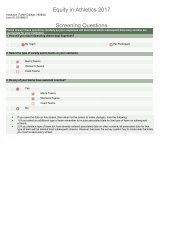Student Code of Conduct final 2018-2019_01
You also want an ePaper? Increase the reach of your titles
YUMPU automatically turns print PDFs into web optimized ePapers that Google loves.
What is Unlawful Harassment<br />
Unlawful harassment refers to harassment on the basis <strong>of</strong> race, color, age, national origin, ancestry, religion, liability<br />
for service in the armed forces, marital status, sexual orientation, civil union, domestic partnership status, gender<br />
identity and expression, criminal record (inquiries only), atypical hereditary cellular or blood traits, genetic<br />
information, handicap/disability, mental illness or any other legally protected characteristic. Unlawful harassment<br />
consists <strong>of</strong> discriminatory behavior which is not welcomed by the <strong>Student</strong> or employee, which is personally <strong>of</strong>fensive<br />
to him or her, and which undermines morale and/or interferes with the ability <strong>of</strong> the <strong>Student</strong> or Employee to work<br />
effectively. It is not possible to list all <strong>of</strong> the circumstances that may constitute unlawful harassment. The following<br />
are examples <strong>of</strong> conduct which, depending upon the circumstances (including the severity and pervasiveness <strong>of</strong> the<br />
conduct), may constitute unlawful harassment:<br />
Comments, slurs, epithets, negative stereotyping, jokes, teasing or verbal abuse directed at a person or<br />
persons because <strong>of</strong> his/her/their protected class status;<br />
Posting or distributing through any means, including through the use <strong>of</strong> electronic communications (e.g.,<br />
email, instant messaging, text messaging, the Internet, voice mail or facsimile), messages, objects,<br />
pictures, cartoons or other materials that are degrading or <strong>of</strong>fensive to a protected class;<br />
Threats, whether explicit or implicit, directed at a person or persons because <strong>of</strong> his/her/their protected<br />
class status;<br />
Continually treating individuals in a protected class differently from others, such as singling individuals out<br />
for harsh treatment because <strong>of</strong> a protected characteristic; and<br />
Taking adverse actions (including disciplinary warning and dismissal) based upon a person’s protected<br />
class status.<br />
It is important to note that while this policy sets forth our goal <strong>of</strong> promoting an environment that is free <strong>of</strong> unlawful<br />
harassment, it is not designed or intended to limit the College’s authority to take disciplinary action, up to and<br />
including termination, for conduct which Fisher College deems unacceptable, regardless <strong>of</strong> whether that conduct<br />
violates this policy or rises to the level <strong>of</strong> unlawful harassment.<br />
All incidents that involve students exclusively will be handled by the <strong>Student</strong> <strong>Conduct</strong> Coordinator. Incidents that<br />
involve a student and an employee will be handled jointly by the <strong>Student</strong> <strong>Conduct</strong> Coordinator and the Human<br />
Resources Department. The College will not tolerate verbal or physical conduct by any employee or student that<br />
harasses, disrupts, or interferes with another’s academic and/or work performance or which creates an<br />
intimidating, <strong>of</strong>fensive, or hostile environment.<br />
Any infractions <strong>of</strong> this policy should be brought to the attention <strong>of</strong> the Dean <strong>of</strong> <strong>Student</strong>s and/or the Human<br />
Resources Department and/or the Title IX Coordinator, depending on the nature <strong>of</strong> the parties involved. The<br />
College’s open-door policy allows for complaints to be brought to any level <strong>of</strong> management, but the complaint will<br />
be processed in accordance with the procedures described in greater detail in our policy for the Elimination <strong>of</strong><br />
Harassment and Discrimination in the Workplace. Complaints will be processed as expeditiously and confidentially<br />
as possible.<br />
If you have any questions about this policy, please speak with the Dean <strong>of</strong> <strong>Student</strong>s at 617-670-4421 or the Title IX<br />
Coordinator at 617-236-5409.<br />
Victims <strong>of</strong> sexual harassment should refer to “Reporting Procedures,” under “Sexual Misconduct and/or Title IX<br />
Policies” in this handbook for further information on sexual harassment.<br />
Formal Complaint Procedure<br />
Where to file a Complaint?<br />
A complaint should be filed to the Title IX Coordinator. The Title IX Coordinator will assess the nature <strong>of</strong> the<br />
complaint and will direct an investigation if appropriate. The title IX Coordinator can be reached at 617-236-5409.<br />
18 | P a g e


